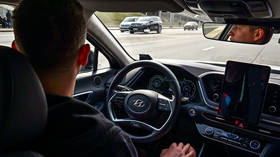Road safety watchdogs urge caution against ‘unrealistic expectations’ after UK okays use of self-driving cars

The UK government has been accused of adding to the “confusion and frequent misuse” of assisted driving technology after its transport department green-lit the use of self-driving cars offering hands-free capability on motorways.
By year’s end, vehicles with automated lane-keeping systems (ALKS) will be permitted on UK motorways with slow-moving traffic, at speeds of up to 37 miles per hour (or about 60 kph), the Department for Transport (DfT) announced on Wednesday.
Transport Minister Rachel Maclean called it a “major step” for self-driving vehicles in the UK, saying it would make future journeys “greener, easier and more reliable.” Consultations on rules to ensure safe use are ongoing, she added.
The move would make the UK the first country to regulate the use of self-driving vehicles – but already road safety experts and automobile insurers are weighing in to urge caution.
Noting that ALKS are simply “assisted driving systems”, Matthew Avery, research director at vehicle safety testers Thatcham Research, said, “By calling ALKS automated our concern is that the UK Government is contributing to the confusion and frequent misuse of assisted driving systems that have unfortunately already led to many tragic deaths.”
“There is still a lot of work needed by both legislators and the automotive industry before any vehicle can be classed as automated and allowed safely on to the UK roads,” Avery added.
Matthew Avery up early today to speak with @richardgaisford about ALKS, which we believe must be described as *Assisted*driving systems https://t.co/m0t4X1TDNJ
— Thatcham Research (@ThatchamRsrch) April 28, 2021
According to the announcement, vehicles with ALKS technology – which uses sensors and software to make the car stay in lane and maintain a safe distance from other vehicles without driver input – can now be legally defined as self-driving as long as nothing “challenges the vehicle’s ability to self-drive.”
Drivers will not be required to keep their eyes on the road or hands on the wheel after handing control to the ALKS, but will need to take over within 10 seconds of being asked to do so by the system – failing which the vehicle will slow down and switch on its hazard lights.
The dangers posed by drivers misunderstanding the capabilities of assisted driving technology are an area of concern, particularly in the US where regulators are probing a number of crashes involving industry pace-setter Tesla’s flagship ‘Autopilot’ system.
Also on rt.com Elon Musk draws flak after claiming data logs clear Tesla’s ‘Autopilot’ of blame in fatal ‘driverless’ vehicle crashDrivers must not be given “unrealistic expectations” about a system’s capability, Mark Shepherd of the Association of British Insurers (ABI) warned, adding that making the distinction between autonomous and assisted is “vital” for safety.
Both Thatcham and ABI outlined four criteria to be met before ALKS can be classed as automated: the system must be able to “safely change lanes”, find “safe harbour” at the side of the road without stopping in a “live” lane, and “recognise UK road signs”. Incident data must also be remotely available to verify whether the driver or system was “in charge” of the vehicle.
The auto industry body, Society of Motor Manufacturers and Traders, welcomed the announcement, however, claiming that automated driving systems could “prevent 47,000 serious accidents and save 3,900 lives over the next decade” by doing away with “the single largest cause of road accidents – human error.”
According to the DfT, human error “contributes to over 85% of accidents.”
But the Automobile Association (AA) motoring group warned against “a race to take drivers’ hands off the wheel.”
If you like this story, share it with a friend!












